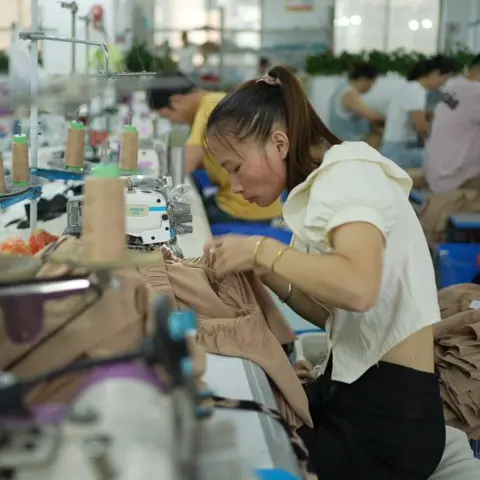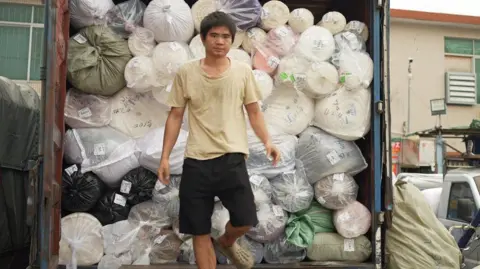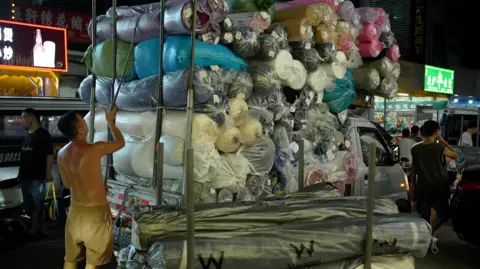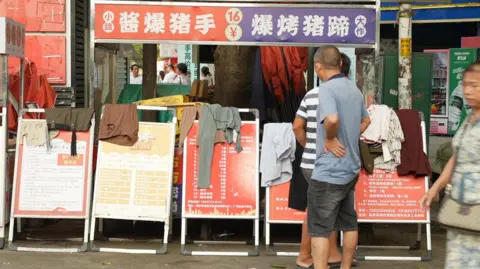 Xiqing Wang/BBC
Xiqing Wang/BBCThe hum of sewing equipments is a steady partially of Guangzhou, a rising port on the Pearl River in southerly China.
It rattles with the open dwelling home windows of producing amenities from early morning until late within the night, as they find yourself the tee shirts, shorts, shirts, trousers and swimsuit that can actually be delivered to load closets in better than 150 nations.
This is the noise of Panyu, the realm known as the “Shein village”, a warren of producing amenities that energy the globe’s greatest fast fashion vendor.
“If there are 31 days in a month, I will work 31 days,” one worker knowledgeable the BBC.
Most claimed they simply have ultimately off a month.
The BBC invested quite a few days under: we went to 10 manufacturing amenities, spoke with 4 proprietors and better than 20 workers. We moreover frolicked at work markets and material distributors.
We found that the pounding coronary heart of this realm is a labor pressure resting behind stitching equipments for round 75 hours per week in battle of Chinese work legislations.
These hours are usually not unusual in Guangzhou, a business heart for nation workers trying to find a better income; or in China, which has really lengthy been the globe’s incomparable manufacturing facility.
But they embrace in a growing list of questions about Shein, as quickly as an obscure Chinese- began enterprise that has really come to be a global behemoth in merely over 5 years.
Still privately-owned, it’s approximated to be value regarding ₤ 36bn ($ 60bn) and is presently a listing on the London Stock Exchange.
Its speedy surge, nonetheless, has really been dogged with debate regarding its remedy of workers and claims of compelled work.
Last yr it admitted to finding children working in its factories in China.
The enterprise decreased to be talked to nonetheless knowledgeable the BBC in a declaration that “Shein is committed to ensuring the fair and dignified treatment of all workers within our supply chain” and is spending 10s of quite a few bucks in reinforcing administration and conformity”.
It included: “We make every effort to establish the greatest criteria for pay and we need that all supply chain companions abide by our standard procedure. Furthermore, Shein deals with auditors to make sure conformity.”
Shein’s success lies in quantity – the stock on-line runs into the lots of of hundreds – and deep reductions: £10 clothes, £6 sweaters, costs that hover under £8 on common.
Revenue has soared, outstripping the likes of H&M, Zara and the UK’s Primark. The cut-price gross sales are pushed by locations just like the Shein village, dwelling to some 5,000 factories, most of them Shein suppliers.
The buildings have been hollowed out to make means for stitching machines, rolls of cloth and baggage brimming with fabric scraps. The doorways to their basements are at all times open for the seemingly countless cycle of deliveries and collections.
As the day passes, the cabinets replenish with warehouse-bound, clear plastic baggage labelled with a now-distinctive five-letter noun.
But even previous 22:00, the stitching machines – and the individuals hunched over them – don’t cease as extra material arrives, in vehicles so full that bolts of color typically tumble onto the manufacturing unit flooring.
 Xiqing Wang/ BBC
Xiqing Wang/ BBC sc-8353772e-0 cvNhQw”>Xiqing Wang/ BBC
sc-8353772e-0 cvNhQw”>Xiqing Wang/ BBCtext-block” course =We >” says a 49-year-old girl from Jiangxi unwilling to offer her identify. “On Sundays””
She is in an alleyway, the place a dozen individuals are huddled round a row of bulletin boards.
They are studying the job advertisements on the board, whereas analyzing the stitching on a pair of chinos draped over it.
This is Shein’s provide chain. The factories are contracted to make garments on order – some small, some massive. If the chinos are successful, orders will ramp up and so should manufacturing. Factories then rent short-term staff to fulfill the demand their everlasting employees can not fulfil.
The migrant employee from Jiangxi is searching for a short-term contract – and the chinos are an choice.
“We sc-eb7bd5f6-0 fYAfXeThe gain so little. ” she says, including that she hopes to make sufficient to ship again to her two youngsters who’re residing with their grandparents.
“We earn money per item, ” she explains. “It depends just how tough the thing is.(* )easy like a tee is one-two yuan Something per item and I can make around a loads in an hour.[less than a dollar] sc-eb7bd5f6-0 fYAfXe”
Examining the stitching on the chinos is essential for making that call. All round her, staff are calculating how a lot they’ll receives a commission to make each bit of clothes and what number of they will make in an hour.
The alleys of Panyu perform as labour markets, filling up within the mornings as staff and scooters rush previous the breakfast dumpling cart, the cups of steaming soybean milk and the hopeful farmer promoting rooster and duck eggs.
 sc-8353772e-0 cvNhQw”>Xiqing Wang/ BBC
sc-8353772e-0 cvNhQw”>Xiqing Wang/ BBCThey discovered that quite a few employees have been working extreme extra time. It famous the fundamental wage with out extra time was 2,400 yuan (£265; $327) – under the 6,512 yuan the Asia Floor Wage Alliance says is required for a ” sc-eb7bd5f6-0 fYAfXe”. But the employees we spoke to managed to earn wherever between 4,000 and 10,000 yuan a month.
“These a severe type of exploitation and this requires to be noticeable.” stated David Hachfield from the group. “It’s sc-eb7bd5f6-0 fYAfXe”
The common working week shouldn’t exceed 44 hours, in response to Chinese labour legal guidelines, which additionally state that employers ought to guarantee staff have a minimum of one relaxation day per week. If an employer needs to increase these hours, it needs to be for particular causes.


